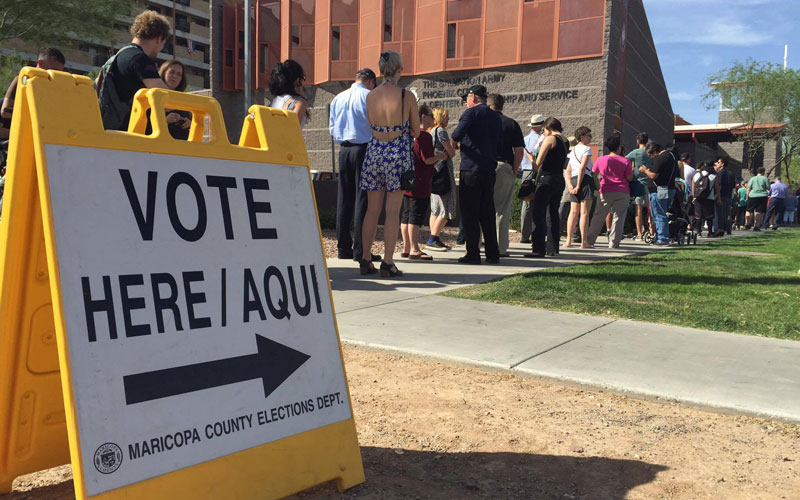
The lawsuit against state and Maricopa County election officials details stories of people being forced to wait hours to vote in hard-to-find polling places that were short-staffed and under-supplied, which it claimed were all violations of voting rights. (Photo by Miguel Otárola/Cronkite News)
WASHINGTON – Democratic groups and voters made good Friday on their threat to sue state and Maricopa County officials for alleged civil rights violations in the March 22 presidential preference election that saw hours-long waits, among other problems at the polls.
The suit filed in U.S. District Court in Phoenix against the secretary of state and the Maricopa County recorder, among others, claimed the poll problems violated the Voting Rights Act and 14th Amendment.
The suit also targeted the attorney general’s office, saying a new state law making it a felony to turn in ballots for others violates the First and 14th Amendments. It was filed on behalf of seven individual voters, a Navajo representative, the state and national Democratic parties, the Democratic Senatorial Campaign Committee and the U.S. Senate campaign of Rep. Ann Kirkpatrick, D-Flagstaff.
They said the suit is necessary to protect the “precious” right to vote “and to prevent the continued disenfranchisement of thousands of Arizona voters – including specifically Arizona’s Hispanic, Native-American, and African-American voters – whose right to vote has been and will continue to be denied or unreasonably infringed upon.”
A spokeswoman for Maricopa County Recorder Helen Purcell said her office hadn’t seen the lawsuit and could not comment. Calls and an email seeking comment from Attorney General Mark Brnovich were not immediately returned Friday.
But a spokesman for Secretary of State Michele Reagan said her office welcomed the litigation, even though officials there had not yet seen the filing.
“We welcome any investigation or inquiry to help get us to the bottom of what occurred,” said the spokesman, Matt Roberts. “There’s really nothing that we’re afraid of.”
Reagan’s office had much the same response last week, when the Justice Department requested documents as the initial steps into a possible investigation of the March 22 election. Those documents are due to be turned over to Justice by next Friday.
The lawsuit claims that minority voters were disproportionately affected in the March 22 elections. It pointed to a sharp reduction in, and poor placement of, polling places with limited parking, wait times of up to six hours, polling places that ran out of provisional ballots and general provisional ballot confusion that led to 18,000 of them being rejected.
The suit mentioned a hearing by the Arizona House Election Committee in which Purcell was asked if she considered the impact on minority voters when deciding where to put the large “vote centers” that took the place of precinct-based polling places. Purcell responded that she considered the county as a whole instead of paying attention to “specific areas,” the suit said.
“In other words, Ms. Purcell made no effort whatsoever to ensure that her decisions would not disparately disenfranchise minority voters in Arizona,” the suit reads.
The suit included horror stories from the individual plaintiffs, who told of waiting hours – in one case next to raw sewage that leaked onto the sidewalk and grass – casting ballots after midnight, waiting for centers to restock Democratic ballots, and missing the vote because of work and child obligations or a lack of parking.
In a phone interview Thursday about the pending suit, Kirkpatrick said a voter’s party, ethnicity, primary language or location should not prevent them from casting a ballot, saying the state needs to “remove these hurdles that disenfranchise voters.”
“I’m getting involved because someone needs to stand up for those voters who stood in line for hours or just couldn’t cast a ballot because they couldn’t afford to wait in line that long,” Kirkpatrick said.
– Cronkite News reporter Lauren Clark contributed to this story.